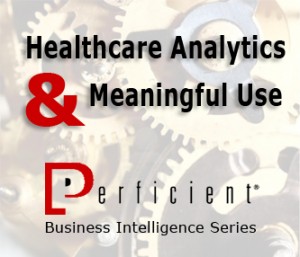 Perficient has created this series, “Healthcare Analytics and Meaningful Use” to drive discussions around unlocking the true potential of EHRs with analytics. Stay tuned for this four-part series to be published throughout October and November. We welcome your comments and questions below.
Perficient has created this series, “Healthcare Analytics and Meaningful Use” to drive discussions around unlocking the true potential of EHRs with analytics. Stay tuned for this four-part series to be published throughout October and November. We welcome your comments and questions below.
Data in and of itself has no value. To add value data must be “crunched” or analyzed to examine changes, predict impacts and determine what is working and what isn’t working. There are some “formulas” at work here:
Date + Meaning = Information (data crunching)
Information + Experience + Context = Knowledge (someone using the information)
EHRs play a pivotal role in providing the healthcare industry with a rich, robust set of data to empower organizations and people. Previously, healthcare analytics have focused on ways to evaluate health by compiling data about epidemics, diseases and illnesses. Today’s analytics are different – they include decision makers throughout an organization.
Dashboards
Dashboards allow business leaders to measure, monitor and manage a business by providing up-to-date information on a departmental level. A dashboard provides a set of analytics to the right person at the right time to ensure that a department runs efficiently and effectively. They allow decision makers to be responsive to current situations and make more informed, on-the-spot decisions.
Clinical Alerts
Clinical alerts are viewed as a potential solution to improving care and the overall health of at-risk and high-risk populations. Recent studies confirm that EHR clinical alerts add great value to the healthcare system and society by alerting physicians to missed healthcare opportunities. Providers use clinical alerts to change trends that are correlated to health risks. Clinical alerts are heavily dependent upon EHRs, and require a system to determine if missed healthcare opportunities such as vaccinations or health tests exist.
Quality Management
Quality management focuses on outcomes. It requires patients receive the proper care at affordable prices. Healthcare quality management relates to procedures or policies that positively affect quality of life, decreases premature deaths and financially strengthen an organization. Essentially, quality management is a progressive way to calculate the bottom-line that includes patient’s health and outcomes in addition to financial viability.
50,000 foot view of Healthcare Analytics
Healthcare analytics can be mesmerizing considering they provide insight into a data-rich industry that has historically been unable to use its data to address efficiency, effectiveness or equity issues. Healthcare analytics bridge the gap between knowledge and action but require EHRs and integrated HIT systems.
Stay tuned for the next blog which examines the role of system integration on healthcare analytics.
Want to learn more? Register for our upcoming analytics webinar and you will be entered to win one of two Perficient client badges to the February HIMSS Conference in Las Vegas!
